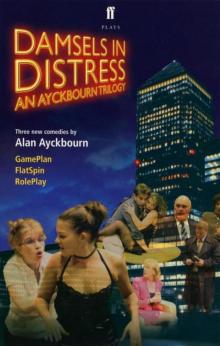- Home
- Alan Ayckbourn
Damsels in Distress
Damsels in Distress Read online
ALAN AYCKBOURN
Damsels in Distress
GamePlan
FlatSpin
RolePlay
Preface by the author
Contents
Title Page
Preface
GamePlan
First Performance
Characters
Note on the Timing
Act One
Scene One
Scene Two
Scene Three
Act Two
Scene One
Scene Two
Scene Three
FlatSpin
First Performance
Characters
Note on the Timing
Act One
Scene One
Scene Two
Act Two
Scene One
Scene Two
RolePlay
First Performance
Characters
Note on the Timing
Act One
Scene One
Scene Two
Act Two
About the Author
By Alan Ayckbourn from Faber
Copyright
Preface
In 2000, having recently reached my sixtieth year and rapidly approaching my forty-fifth working in theatre, I began to yearn, once again, for a permanent acting company which during the sixties, seventies and early eighties were the mainstay of the Theatre in Scarborough. Recently, as with so many regional companies, we had begun to rely more and more on actors visiting us, short term, for one or maybe two productions. Spot-casting in this way has its advantages. You tend to get just the right actor for the right part and, given the shorter nature of the engagement, a wider range of performers willing to tear themselves away from family, friends and other more lucrative London-based work.
What you lose of course is the true company. The moment when a group of individual (sometimes highly individual) actors through familiarity, growing confidence and trust in each other forms that most unique of all theatrical achievements – a shared ‘corporate’ identity. The individuality remains – but the sum of the separate parts has generated something greater and stronger.
In my experience, some companies are highly stable and are happy to remain together for months, even years. These, ironically, are often made up of those who offstage prefer to go their separate ways. Their working lives are close-knit and shared; their personal lives are worlds apart. Conversely, the group that eats, drinks, sometimes sleeps (and incidentally acts) together proves usually to be short lived and unstable. It is nothing you can plan for. Who can foretell whether X will take an instant dislike to, or have an overwhelming desire for Y? Personally, I try to put together companies consisting of people that I like and trust to luck that this common bond will prove a strong enough glue to hold the elements together.
It was with this principle in mind that I put together the 2001 Scarborough summer company of seven. The contract was technically from April to November but was in effect open-ended. It was intended that we would stay together until the glue melted. As additional security I also retained the services of the experienced, trusted resident stage management team of three. Lacking an assistant director, I fully knew the importance of having someone to provide aftercare, comfort and support if the going got rough.
I had written the company two plays, GamePlan and FlatSpin. Both were really entirely separate, linked by an identical cast size and the same set. The overall title I selected for them both, Damsels in Distress, did, though, reflect the fact that both were about women who one way or another had found themselves up against it in the modern world.
The plays were duly cast from actors some of whom I had worked with before and some, thanks to my invaluable casting director Sarah Hughes, new to me. The longest serving, Robert Austin, had worked originally with me way back in the seventies, creating amongst other things the part of Sven in Joking Apart in 1978, which transferred from Scarborough to London that same year. Jacqueline King and Bill Champion had also done a Scarborough to West End transfer twenty years later in Comic Potential. Of the more recent members, Alison Pargeter and Saskia Butler had both appeared a few months earlier in the 2000 Christmas show, Whenever, which I had written with composer Denis King. Finally, Beth Tuckey and Tim Faraday, neither of whom I had worked with before. New and old. Reassuring and unfamiliar, just enough to keep me, as director, on my toes. Final chemistry ultimately unknown.
In the event, the balance was just fine. GamePlan rehearsed and opened successfully and, in what seemed like no time at all (about seven or eight weeks) we were midway through rehearsals for FlatSpin. It was then that the ‘company’ effect began to take hold, like it had done in the past. As the group developed and consolidated, so I began to get the desire to write something more for them. Mid-morning during a rehearsal, I announced that there could – possibly be – if they didn’t mind – though it wasn’t in any of their contracts – so if they did mind of course, then I wouldn’t mind – there could be a third play for them to do … Rather stunned, they agreed. I don’t, in retrospect, think it was much of a choice for them, though.
We opened FlatSpin on a Tuesday. I went home rather prematurely from the first-night party. The following day I started work on what was to become RolePlay. Just over a week later, on the following Thursday, I presented the cast with their new script. Damsels in Distress was now officially a trilogy. Same set, same actors but a totally fresh set of characters.
Although the plays can be seen individually and in any order, this last written piece by happy coincidence brought the entire company on-stage together in a seven-handed scene for the first and only time. A fitting finale, I thought.
I suppose that one day these plays will be produced by others. I hope they will. Already there are productions planned for one or more of them, singly, here and there. But for me they will always remain an entity, born out of a company. Written for a small group of actors with talent, stamina, a sense of teamwork and a taste for adventure. Here’s to that original ‘magnificent seven’.
Alan Ayckbourn
June 2002
GAMEPLAN
GamePlan was first performed at the Stephen Joseph Theatre, Scarborough, on 29 May 2001. The same production was subsequently presented by Michael Codron, Lee Dean, Michael Linnit, David Ian for ClearChannel Entertainment and Andrew Lloyd Webber, at the Duchess Theatre, London, on 7 September 2002. The cast was as follows:
Lynette Saxon Jacqueline King
Sorrel Saxon Saskia Butler
Kelly Butcher Alison Pargeter
Leo Tyler Robert Austin
Dan Endicott Tim Faraday
Grace Page Beth Tuckey
Troy Stephens Bill Champion
Director Alan Ayckbourn
Designer Roger Glossop
Lighting Designer Mick Hughes
Costume Designer Christine Wall
Characters
Sorrel Saxon
a schoolgirl, sixteen
Lynette Saxon
her mother, a former businesswoman, forty
Kelly Butcher
her friend, a schoolgirl, sixteen
Leo Tyler
a retired dry cleaner, forties
Dan Endicott
a police detective sergeant, forties
Grace Page
a WPC, thirties
Troy Stephens
a tabloid journalist, thirties
A riverside apartment in London’s Docklands
Act One
Scene One: November, 6 a.m.
Scene Two: the same evening, 6 p.m.
Scene Three: a week later, early afternoon
Act Two
Scene One: the same evening,
11 p.m.
Scene Two: a fortnight later, 6 p.m.
Scene Three: three weeks later, 4 p.m.
Act One
SCENE ONE
A riverside apartment on the Thames, somewhere in London’s Docklands. A main sitting area and an adjoining walk-through kitchen/dining area. Sliding windows at one end of the sitting area lead on to a small riverside balcony. At the other end of this sitting area, an understocked bar. Near the window, a desk and chair. A sofa, an armchair and a heavy coffee table. A few quite healthy pot plants dotted around. Leading off this area is a short hallway leading directly to the front door. Also two archways leading to another area visible to us, the common kitchen/dining space. The kitchen end is tidy and well equipped, evidently regularly cleaned. The other end has a small dining table with four chairs. Leading from this is a further door to the offstage bedrooms. At the start it is 6 a.m. on a cold late-November morning, not yet daylight. The room is lit by the soft yellow glow of sodium lights reflected from the river. After a moment, Lynette, a woman in her early forties, enters from the bedroom. She has evidently recently awoken. Although already dressed in sweater, jeans and trainers, she’s still half-asleep. She is tired, run-down and all in all not in the best of health. She goes straight to the kitchen, lifts the kettle to check it has water and switches it on. She finds a mug and primes it with a tea bag. The effort of this has set her off in a fit of coughing.
Lynette (recovering from this first bout) Oh, God …
This seems to set her off again. She looks towards the bedroom and, trying to muffle the cough, goes to the windows, grabbing her bag on the way. She slides them open and steps on to the balcony. She half-closes the door behind her. Eventually the coughing fit subsides.
(eyes watering) Oh, dear God.
Lynette clutches her chest and takes a few recuperative deep breaths. More or less recovered, she opens her bag and takes out a packet of cigarettes. She lights up and takes a deep drag. She starts another fit of coughing. Eventually she stops again and takes another drag. Her daughter Sorrel, aged sixteen, comes out of the bedroom, still in her pyjamas. She looks round blearily, awoken by the coughing but not immediately locating her mother. She sees Lynette and shakes her head in disbelief. She crosses to the window and opens it.
Sorrel (in exasperation) Mum, what do you think you’re doing?
Lynette Oh, darling, I didn’t wake you, did I?
Sorrel Will you put that cigarette out at once, please?
Lynette Oh, come on, this is only my first.
Sorrel I should hope so, it’s only six o’clock.
Lynette I didn’t mean to wake you, go back to bed.
Sorrel You promised me again last night that you’d stop.
Lynette I will. I’m going to. I can’t stop just like that, though, can I? I read somewhere that can be just as bad for you, stopping suddenly, as it is to carry on smoking forty a day.
Sorrel Where the hell did you read that?
Lynette You go back to bed.
Sorrel Have you had any tea?
Lynette I’m just making some.
Sorrel I’ll do it. (She moves to the kitchen.) It’s freezing out there, come in. You’ll get pneumonia as well. Mothers! Who needs them?
Lynette (coming back into the room) I was trying not to wake you, that’s all.
Sorrel (starting to make them both tea) If you don’t want to wake me then don’t stand out there coughing yourself to death outside my bedroom window.
Lynette This is the last one I’m having this morning.
Sorrel (unimpressed) Great.
Lynette I don’t know why you don’t go back to bed. You don’t need to get up for another hour.
Sorrel I’ll do some revision.
Lynette You were up until God knows when. What time did you come to bed?
Sorrel About two.
Lynette Sorrel, four hours’ sleep isn’t enough.
Sorrel It’s enough for you, apparently.
Lynette I’m older. I don’t need sleep. You’ll collapse. What were you doing till two o’clock, anyway?
Sorrel Nothing. Just on the internet, that’s all.
Lynette Well, I hope it was nothing – you know …
Sorrel What?
Lynette You know. Like that.
Sorrel Oh, come on, Mum. I’m sixteen, for God’s sake. It was just a chat room, that’s all. (Sorrel brings the two mugs of tea to the table.) Here you are.
Lynette Thanks. Chat rooms. I don’t know what people find to talk about …
Lynette sits at the table with her mug. She takes a mirror from her bag and studies herself. Sorrel stands and watches her, sipping her own tea as she does so.
Sorrel I wouldn’t bother, you look terrible.
Lynette Thank you. (She stares at herself without enthusiasm, jabs at her hair with her fingers and then gives up and puts away the mirror.)
Sorrel Were you serious last night?
Lynette Mmm?
Sorrel Were you serious? About us having to move?
Lynette We can’t afford to live here much longer, that’s for sure.
Sorrel Where will we go?
Lynette We’ll find somewhere.
Sorrel Where?
Lynette Somewhere less expensive than here. I don’t know. Maybe even out of London.
Sorrel (outraged) Out of London?
Lynette Possibly. Property’s much cheaper once you get –
Sorrel What about school?
Lynette Well, you may have to commute, I don’t know –
Sorrel Commute? Where from, Birmingham?
Lynette Don’t be silly. We all have to make sacrifices. That’s the price we pay.
Sorrel All except Dad.
Lynette What?
Sorrel Hell of a lot of sacrifices he’s made.
Lynette (muted) Don’t start on that again.
Sorrel Sunning himself on some bloody beach with that woman.
Lynette Please, Sorrel, that’s enough …
Sorrel I hope he gets skin cancer …
Lynette Sorrel!
Sorrel I hope they both do.
Lynette Don’t say that, even as a joke.
Sorrel I’m not joking. I hate him. The bastard. I hate him for what he’s done to us. To you.
Lynette We were probably both to blame, I don’t know …
Sorrel (outraged) How can you both be to blame? How can you say that –?
Lynette Alright, Sorrel! That will do!
Sorrel Our business folds, he does nothing, you nearly collapse with stress and he runs off with your partner. Terrific. Thanks so much, Father.
Lynette is crying softly.
(contritely) Sorry.
Lynette I don’t want you to get like this. Please promise me you won’t get like this.
Sorrel How do you mean?
Lynette All – bitter and – vengeful. It’s negative. It’s pointless. All it hurts in the end is yourself.
Sorrel I’ll try not to be. Just promise me one thing, though …
Lynette What?
Sorrel If you ever see me getting seriously involved with a man, that you’ll shoot me first.
Lynette I’ve told you. Forget all about Dad. We start again. You and me. New life. Fresh start.
Sorrel And you’re not even trying to get money out of him?
Lynette We don’t know where he is.
Sorrel Do you think he’ll ever get in touch again?
Lynette I wouldn’t. Maybe for you, he might. Maybe he’ll want to see you again.
Sorrel Me? He didn’t even like me.
Lynette Oh, yes he did.
Sorrel Anyway, he owes us something.
Lynette He hasn’t got any money, either. We lost the lot, didn’t we?
Sorrel It was so quick.
Lynette These things are. One minute you’ve – millions. On paper, anyway – well, not even on paper – on screen. And the next minute …
Sorrel Bloody dead loss dot com. Dot utte
r disaster com.
Lynette We weren’t the only ones. And there’ll be lots more.
Pause.
I’m sorry I shouted at you last night. I was just tired.
Lynette coughs and by reflex reaches into her bag for another cigarette.
Sorrel (a warning) No …
Lynette Oh, come on! This is only my sec –
Sorrel (fiercely) NO!
Lynette hesitates.
Mum, if you light that cigarette, I warn you I will, I really will walk out and I swear I won’t come back. I refuse to sit around here and watch you slowly kill yourself, OK?
Lynette has another small coughing fit but puts away the cigarette, reluctantly.
Oh, what’s the point? You’ll light up as soon as you’re out the front door, won’t you?
Lynette No, I won’t. I can be strong-willed if I want to be. (looking at her watch) I’d better go.
Sorrel Seriously. What are we going to do? We can’t carry on like this.
Lynette We’ll manage.
Sorrel We are clearly not, though, are we? We’re going to have to move, we’ve got no money. You haven’t even got a proper job. I may finish up moving schools, God knows where we’ll go –
Lynette I’ve told you, you are not moving schools.
Sorrel It may come to that, mightn’t it? We certainly can’t afford to live round here any more.
Lynette And I have got a proper job.
Sorrel What? Temporary office cleaner?
Lynette It’s a perfectly good job. Hundreds of people –
Sorrel Working twelve hours a day?
Lynette Nonsense. Dozens of –
Sorrel Getting paid next to nothing?
Lynette Sorrel, don’t be such a snob. It’s a perfectly decent job. Lots of people do it!
Sorrel Mum, you used to run offices, now you’re cleaning them.
Lynette Times change, don’t they? (getting up) I’ll see you this evening.
Lynette gets her coat from the hallway and starts to put it on during the next.

 Damsels in Distress
Damsels in Distress Alan Ayckbourn Plays 1
Alan Ayckbourn Plays 1 Three Plays
Three Plays